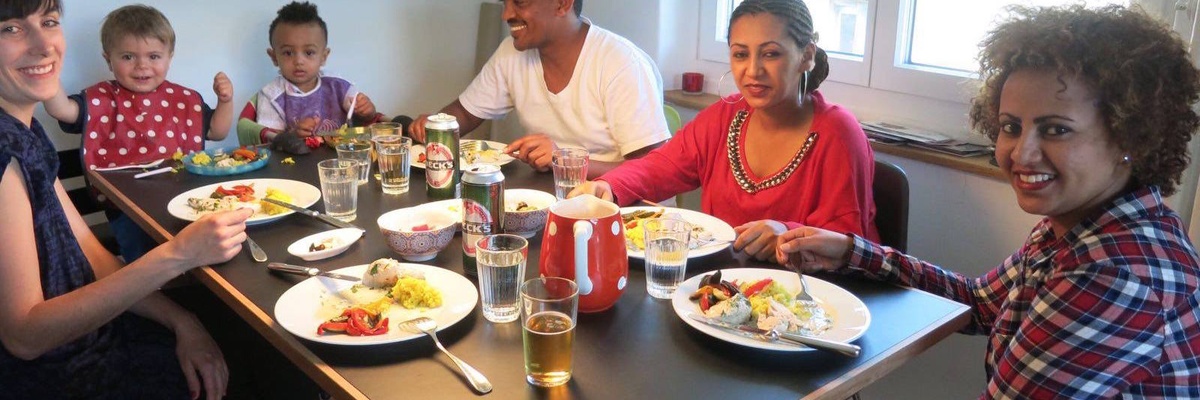
United Invitations is a welcoming movement that has been growing very quickly across Europe and the world. As levels of migration grow and fear and uncertainty escalate, this is a simple idea that brings people together, no matter what their background, to share a meal. It's all about food, language and social interaction.
The meal is a dinner, free of charge in someone’s home or in a public space e.g. a local community centre or café. The meal takes place with no strings attached, and signing up includes no obligations apart from serving food at an agreed time. Host and guests participate out of their own free will and with responsibility for themselves. At least one of the participants should be a person who has recently arrived from a different country. The guest is always welcomed to bring another person along to the dinner.
As part of the Swarthmore Community Challenge, you can get seed funding to organize a series of welcome dinners on campus to bring people from different backgrounds together. You could do one bigger dinner when restrictions allow or you could organize remote dinners
Why it Matters
People arrive in our communities every day, some have been here for years but it can be very difficult to find a place in our society, often not having the opportunity to meet and talk to others who live here. The best way to learn a new language is by speaking it regularly, but many immigrants do not know a single native speaker. On the other hand, many people also do not know any newly arrived immigrants. By coming together and sharing a meal, cultural and language barriers can be broken down.
United Invitations is a non-governmental organisation founded by a young Swedish women, Ebba Åkerman, who is passionate about helping new arrivals in a country integrate and settle into their local community. The idea originates in Sweden and has spread very quickly across Europe with hundreds of dinners taking place over the past two years.
Host and guests participate out of their own free will and with responsibility for themselves.
United Invitations is a welcoming movement that has been growing very quickly across Europe and the world. As levels of migration grow and fear and uncertainty escalate, this is a simple idea that brings people together, no matter what their background, to share a meal. It's all about food, language and social interaction.
The meal is a dinner, free of charge in someone’s home or in a public space e.g. a local community centre or café. The meal takes place with no strings attached, and signing up includes no obligations apart from serving food at an agreed time. Host and guests participate out of their own free will and with responsibility for themselves. At least one of the participants should be a person who has recently arrived from a different country. The guest is always welcomed to bring another person along to the dinner.
As part of the Swarthmore Community Challenge, you can get seed funding to organize a series of welcome dinners on campus to bring people from different backgrounds together. You could do one bigger dinner when restrictions allow or you could organize remote dinners
Why it Matters
People arrive in our communities every day, some have been here for years but it can be very difficult to find a place in our society, often not having the opportunity to meet and talk to others who live here. The best way to learn a new language is by speaking it regularly, but many immigrants do not know a single native speaker. On the other hand, many people also do not know any newly arrived immigrants. By coming together and sharing a meal, cultural and language barriers can be broken down.
United Invitations is a non-governmental organisation founded by a young Swedish women, Ebba Åkerman, who is passionate about helping new arrivals in a country integrate and settle into their local community. The idea originates in Sweden and has spread very quickly across Europe with hundreds of dinners taking place over the past two years.
Host and guests participate out of their own free will and with responsibility for themselves.
Eloisa Garcia
